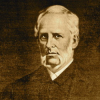Tryon Edwards

Tryon Edwards
Tryon Edwards was an American theologian, best known for compiling A Dictionary of Thoughts, a book of quotations. He published the works of Jonathan Edwardsin 1842. He also compiled and published the sixteen sermons of his great grandfather, Jonathan Edwards, on 1 Corinthians 13, the "Love Chapter", titling the book "Charity And Its Fruits; Christian love as manifested in the heart and life", which was thought by some to be the most thorough analysis of the text of 1 Corinthians...
NationalityAmerican
ProfessionTheologian
CountryUnited States of America
Thoughts lead on to purposes; purposes go forth in action; actions form habits; habits decide character; and character fixes our destiny.
High aims form high characters, and great objects bring out great minds.
To murder character is as truly a crime as to murder the body: the tongue of the slanderer is brother to the dagger of the assassin
Indolence is the dry rot of even a good mind and a good character; the practical uselessness of both. It is the waste of what might be a happy and useful life.
Thoughts lead on to purpose, purpose leads on to actions, actions form habits, habits decide character, and character fixes our destiny.
Mystery is another name for our ignorance; if we were omniscient, all would be perfectly plain
Whoever in prayer can say, ""Our Father,"" acknowledges and should feel the brotherhood of the whole race of mankind
Accuracy of statement is one of the first elements of truth; inaccuracy is a near kin to falsehood.
People never improve unless they look to some standard or example higher or better than themselves.
He that never changes his opinion never corrects mistakes and will never be wiser on the morrow than he is today.
Facts are God's arguments; we should be careful never to misunderstand or pervert them.
To rule one's anger is well; to prevent it is better.
Seek happiness for its own sake, and you will not find it; seek for duty, and happiness will follow as the shadow comes with the sunshine.
Some so speak in exaggerations and superlatives that we need to make a large discount from their statements before we can come at their real meaning